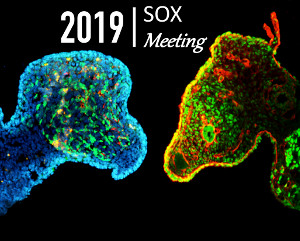 SOX genes form a family of 20 genes that preside over cell fate determination in virtually every lineage, from pluripotent embryonic stem cells to adult terminally differentiated cells. Consequently, mutations in SOX genes underlie a diverse set of severe human diseases including sex¬ reversal (SRY, SOX9), campomelic dysplasia (SOX9), Waardenburg and Hirschsprung disease (SOX10) and several aggressive forms of cancer (SOX2, SOX4, SOX9, SOX11). Given their vast range of actions, it is not surprising that SOX genes have become a central interest of many labs worldwide and more than 20000 publications addressing their functions have been published to date.
SOX genes form a family of 20 genes that preside over cell fate determination in virtually every lineage, from pluripotent embryonic stem cells to adult terminally differentiated cells. Consequently, mutations in SOX genes underlie a diverse set of severe human diseases including sex¬ reversal (SRY, SOX9), campomelic dysplasia (SOX9), Waardenburg and Hirschsprung disease (SOX10) and several aggressive forms of cancer (SOX2, SOX4, SOX9, SOX11). Given their vast range of actions, it is not surprising that SOX genes have become a central interest of many labs worldwide and more than 20000 publications addressing their functions have been published to date.
The “Vth International SOX Research Conference” will bring together researchers focusing on this important gene family to present latest developments, discuss unpublished data and evaluate novel approaches using a wide range of model systems including drosophila, zebrafish and mouse. The meeting will highlight recent technological developments including genomic approaches (single cell RNAseq, ChIPseq), and rapid genome editing techniques in vitro and in vivo. Providing ample time for discussions, we expect the conference to provide an up to date forum for SOX research and serve as a springboard for novel collaborative projects.
Organizers
Francis Poulat. IGH. Montpellier. France
Andreas Schedl. IBV. Nice. France
Steering committee
- Veronique Lefebvre. Children’s Hospital of Philadelphia. USA
- Hisato Kondoh. Kyoto Sangyo University. Japan
- Peter Koopman. IMB. Brisbane. Australia
- Michael Wegner. University of Erlangen. Germany

"Domaine de Mousquety"